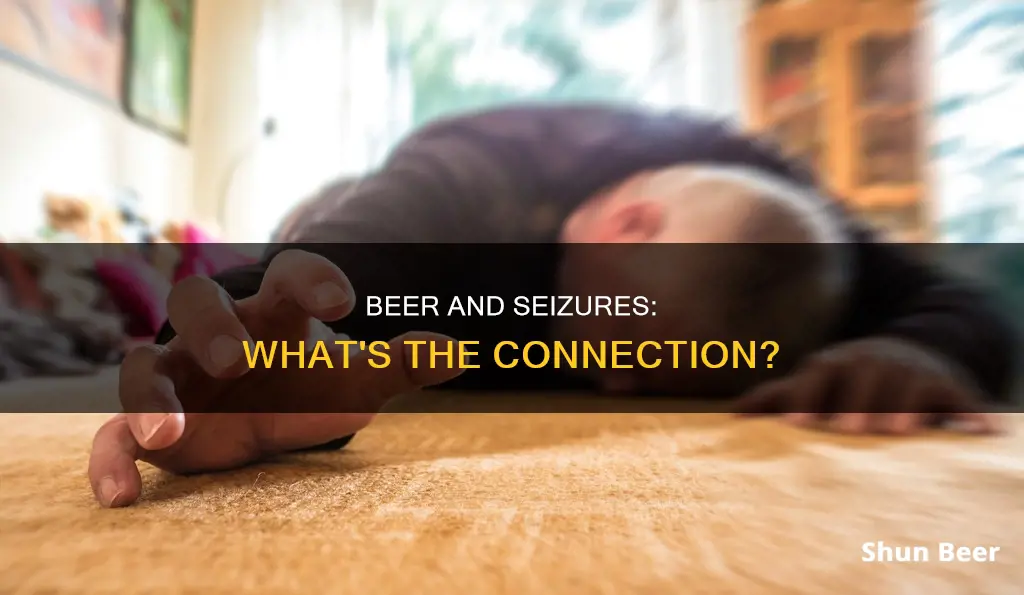
Drinking alcohol is a common social activity, but for people with epilepsy, it can be dangerous. Alcohol can increase the likelihood of seizures, especially during a hangover when the brain is dehydrated. Alcohol interacts with anti-seizure medication, and binge drinking can lead to status epilepticus, a life-threatening condition. While small amounts of alcohol may not trigger seizures, withdrawal from heavy drinking can, and this can affect people with or without epilepsy. This complex relationship between alcohol and seizures means that people with epilepsy must carefully weigh the risks of drinking.
| Characteristics | Values |
|---|---|
| Alcohol as a seizure trigger | Alcohol does not cause seizures in small amounts. A drink or two does not increase seizure activity. |
| Alcohol withdrawal | Alcohol withdrawal can cause seizures. This usually occurs 6-72 hours after drinking. |
| Binge drinking | Binge drinking can lead to status epilepticus, a life-threatening condition. |
| Alcohol and seizure medication | Alcohol can lower your tolerance and increase the effects of seizure medicines. It can also affect how certain medications are absorbed by the body. |
| Alcoholism and epilepsy | There is evidence that alcoholism can cause long-term epilepsy. |
| Safe alcohol consumption for people with epilepsy | It is recommended that people with epilepsy avoid alcohol completely. However, drinking small amounts (1-2 drinks) is unlikely to cause seizures. |
What You'll Learn

Alcohol withdrawal can cause seizures
Alcohol withdrawal seizures are often preceded by signs of severely irritated CNS such as hyperreflexia and ankle clonus. They are typically brief, recurring within 6 to 12 hours, and self-limiting. However, in some cases, they can lead to status epilepticus, a life-threatening condition.
The risk of alcohol withdrawal seizures is increased for those with a history of prior withdrawal seizures, concurrent withdrawal from other sedative-hypnotic drugs, or repeated withdrawals—a phenomenon known as the "kindling effect".
Treatment for alcohol withdrawal seizures typically involves the administration of benzodiazepines such as diazepam or lorazepam. These drugs are effective in preventing seizure recurrence. In contrast, phenytoin has been found to be ineffective in preventing recurrent seizures.
It is important to note that the combination of alcohol and certain anti-epilepsy drugs can be dangerous and may increase the risk of seizures. Therefore, it is crucial to consult with a medical professional before consuming alcohol if you have epilepsy or are taking anti-epilepsy medication.
Drinking Beer in Your Front Yard: Legal or Not?
You may want to see also

Binge drinking can increase the risk of seizures
Binge drinking is a dangerous activity that can have severe health consequences, including an increased risk of seizures. This is true for people with or without epilepsy. While drinking alcohol in moderation does not typically trigger seizures, binge drinking can cause alcohol withdrawal seizures as the body and brain adjust to the absence of alcohol.
Alcohol withdrawal seizures can occur within a few hours or up to 72 hours after stopping drinking. They are more likely to occur in individuals who have abused alcohol for years and are dependent on it. The risk of seizures during alcohol withdrawal is higher for those who have experienced seizures in the past, whether or not they have epilepsy.
Binge drinking can lead to status epilepticus, a life-threatening condition. It can also cause permanent changes in the brain, making individuals more susceptible to seizures even if they stop drinking altogether. Additionally, binge drinking can lower one's tolerance for alcohol, leading to rapid intoxication, which can be dangerous when combined with the side effects of seizure medications.
The combination of alcohol and seizure medications can also be dangerous. Alcohol can make some seizure medications less effective, leading to breakthrough seizures. It can also enhance the sedative effects of certain medications, causing individuals to feel 'drunker' faster. Therefore, it is crucial for people with epilepsy to consult their doctors before consuming alcohol, as the potential risks are significant.
Morning Beer: Should You Drink Before Work?
You may want to see also

Alcohol interacts with epilepsy medication
Secondly, alcohol can interact with anti-epilepsy drugs, increasing the likelihood of a seizure or causing other health issues. For example, Keppra and alcohol may increase the risk of liver problems, while lamotrigine and alcohol may cause drowsiness. Anti-epilepsy drugs can also lower your tolerance for alcohol, leading to faster intoxication.
Additionally, alcohol can make some seizure medications less effective by altering how the body processes them. This could lead to breakthrough seizures. Drinking alcohol while taking seizure medications can also enhance the effects of both substances, leading to stronger feelings of drunkenness.
It is important to note that certain anti-epilepsy drugs should not be combined with alcohol. For instance, benzodiazepines, found in medications like clonazepam (Klonopin), lorazepam, and diazepam (Valium), can have dangerous interactions with alcohol, affecting heart rate, breathing, and cognitive functions.
Therefore, it is crucial for individuals with epilepsy to consult their doctor or pharmacist before consuming alcohol, as the combination may have serious consequences.
Beer and Metronidazole: Is It Safe to Mix?
You may want to see also

Alcohol can cause your brain to become more excitable
Alcohol acts on the brain through several mechanisms that influence seizure thresholds. These include effects on calcium and chloride flux through the ion-gated glutamate NMDA and GABA receptors. During prolonged intoxication, the body adapts to the effects of alcohol, resulting in tolerance. However, these adaptive effects are temporary and disappear once alcohol consumption is stopped.
When alcohol consumption is stopped suddenly or reduced significantly over a short period, the brain becomes more active, and a seizure may occur. This is known as alcohol withdrawal, and it usually occurs 6-48 hours after the last drink. The risk of seizures is much higher after consuming three or more alcoholic beverages.
Binge drinking and alcohol withdrawal can lead to status epilepticus, a life-threatening condition. Alcohol abuse can also increase a person's risk of developing epilepsy. Some studies suggest that repeated alcohol withdrawal seizures may make the brain more excitable, leading to unprovoked epilepsy seizures, even in the absence of alcohol use.
Therefore, it is essential to avoid binge drinking and alcohol abuse and to seek help if you have a problem with alcohol consumption.
Mixing Beer and Vodka: A Safe Night Out?
You may want to see also

Alcoholism can cause seizures
Alcoholism, or chronic alcohol abuse, can cause seizures, even in people without epilepsy. The most common way this occurs is during withdrawal, when an alcoholic stops drinking. Alcohol has a relaxing effect on the brain, making seizures less likely to occur. However, when chronic heavy drinkers suddenly stop, their brain becomes much more active, and this can trigger a seizure. This usually happens within 6 to 48 hours after the last drink. Some people are more prone to these types of seizures than others, and it is not yet clear why. It does not necessarily mean that they will go on to develop epilepsy, which is characterised by two or more unprovoked seizures.
There is also evidence that long-term alcoholism can cause epilepsy. Research has shown that repeated binge drinking and withdrawal can cause permanent changes in the brain, making it more likely that a person will experience seizures in the future, even if they stop drinking alcohol completely. Alcohol affects the brain in several ways, including influencing the flux of calcium and chloride through the ion-gated glutamate NMDA and GABA receptors.
Alcohol withdrawal seizures are distinct from epilepsy seizures and can be more dangerous. Binge drinking and alcohol withdrawal can even lead to status epilepticus, a life-threatening condition. Alcohol abuse is a major cause of this condition, accounting for 9-25% of cases.
If you are struggling with alcohol abuse, it is important to seek help. Alcohol abuse is a medical problem that can lead to other health issues, including an increased risk of developing epilepsy.
Gluten Sensitivity and Beer: What's Safe to Drink?
You may want to see also
Frequently asked questions
Drinking small amounts of alcohol is unlikely to make you have more seizures. However, heavy drinking over a short space of time (binge drinking) can make you more likely to have a seizure. It is recommended that those with epilepsy avoid alcohol completely if possible.
Yes, epileptic seizures occur in 5 to 15% of individuals drinking alcohol, but the majority are due to withdrawal. Alcohol withdrawal seizures can occur within a few hours or up to 72 hours after stopping drinking.
Alcohol can make some seizure medications less effective. It can make your body process certain anti-seizure medication faster, which could lead to a breakthrough seizure. Alcohol can also increase the side effects of some seizure medications.







